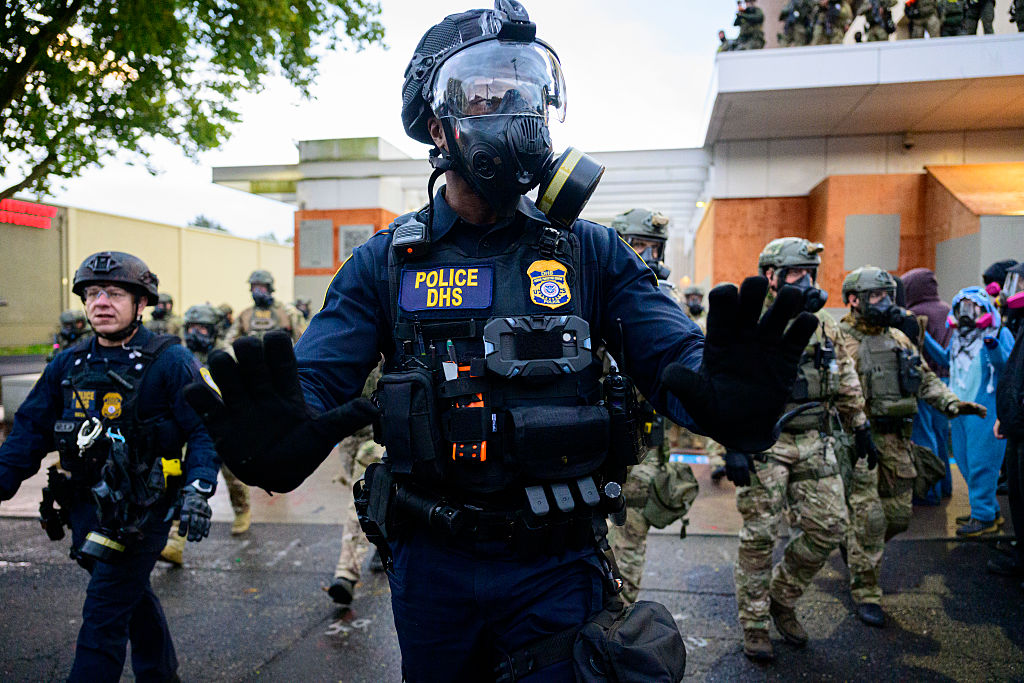For months, the White House and federal agencies have drawn outrage from critics for social media posts promoting President Trump’s immigration agenda. Some of the posts deploy jokes or memes. Others use language or images seen as racist dog whistles. This week, the Department of Homeland Security drew pushback for a post that was just one word: remigrate.
[time-brightcove not-tgx=”true”]
The term, which has been embraced among Trump’s MAGA base, has a fraught history in Europe, where it has ties to white nationalism and has been seen as a euphemism for ethnic cleansing.
The short post on X was followed by a link to a government site promoting self-deportation.
Where “remigration” came from
The term “remigration” has traditionally been used in Europe to refer to the mass deportation of non-white immigrants. It has been used by right-winged politicians such as Austria’s Herbert Kickl and Germany’s Alice Weidel of the right-wing populist Alternative for Germany (AfD) party. The term has also been popularized by the Austrian, millennial far-right influencer Martin Sellner.
“In Europe, it’s an established part of the linguistic toolbox of white supremacy,” Nicholas J. Cull, a professor of communication at the University of Southern California, tells TIME.
The use of the term in Germany and Austria has been a trademark of recent anti-immigration campaigns. Protests across Germany were sparked last year after it was alleged that AfD party members and far-right Austrians were plotting to deport thousands of migrants, causing mass pro-democracy demonstrations.
When asked for comment on its post from Tuesday, Tricia McLaughlin, a Homeland Security spokesperson, responded in an email, “Is the English language too difficult for you?” The message was followed by a Collins English Dictionary definition of the word “remigrate.”
The DHS post seems to be a nod to the efforts of the State Department to create an “Office of Remigration,” the plans for which were rolled out through a proposal in May that called for an overhaul of the agency that would cut a series of programs and reduce domestic staffing. The details of the plan are outlined in a 136-page document that the State Department sent to six Congressional Committees. The document says the Office of Remigration will “actively facilitate the voluntary return of migrants to their country of origin or legal status.”
This year, Trump has embraced the term and used it multiple times on social media. “America was invaded and occupied. I am reversing the Invasion. It’s called Remigration,” he said in one Truth Social post from June.
“Everybody can hear what this means,” Cull says of the DHS post. “It’s a clear escalation in the language around issues of migration.”
A string of similar rhetoric
The department’s use of the word and the baggage it carries follows a pattern of posts by Trump and Administration officials that appear to disfavor certain groups living in the U.S. and promote Trump’s mass deportation campaign.
In August, the Administration was accused of quoting a white supremacists in a DHS post for Immigration and Customs Enforcement (ICE) recruiting. The department wrote the caption, “which way, American man?” which was argued to reference Which Way, Western Man, a 1978 book by the white supremacists William Gayley Simpson, who was a supporter of Hitler.
In other posts, the agency depicts an old Morgan Weistling painting of a white family with the caption, “remember your homeland’s heritage,” while misnaming the painting.
Other posts call Immigration and Customs Enforcement (ICE) applicants to “defend your culture!” One post shows a photo of the Capitol circa 1943 with the caption, “we can return.”
Also this week, the U.S. Border Patrol posted, and then later deleted, an Instagram reel this week that used an antisemitic slur from the Michael Jackson song “They Don’t Care About Us,” which was condemned by Jewish groups when the song was released in 1995, prompting Jackson to update the song.
“Jew me, sue me, Everybody, do me, Kick me, k*ke me, Don’t you black or white me,” the lyrics go in the video, which, unlike certain streaming services that have blurred out the offensive language, were not edited out by the agency.
“This is, unfortunately, part of how extreme politics works, that it tries to find ordinary ways to describe horrible and morally abhorrent things,” Cull says.

